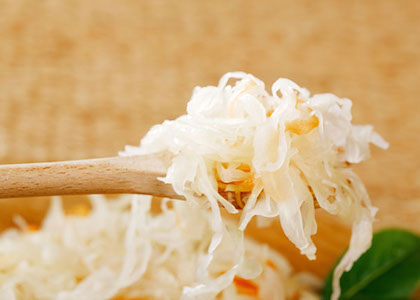
The Power of Probiotics
By Kristen DeAngelis
Have you ever taken antibiotics or started coming down with a cold and taken “probiotics”? Prebiotics and Probiotics have become popular in the health community but consumers may be unaware of their conclusive benefit.
Think of your body like a tree. Your “tree” grows bigger and stronger, but the roots are where it starts. The intestinal microflora, which resides in the gut, is a contributing factor to your systemic health, and cannot grow in a positive direction without balance.
Vital cell-to-cell communication and signaling pathways occur along these roots, and your gut must maintain a balance between the good and bad bacteria to allow healthy immunological responses.
Research has found a balanced microbiota has many benefits:
– Overall strengthened immunity
– May prevent occurrence and reduces severity of allergies
– May help prevent infection and compromised immunity (common cold)
– Helps regulate digestion
– Helps treat digestive conditions like: IBS, IBD, Celiac’s, Chron’s, Diarrhea
– May improve brain function and cognition
– Potential association in treatment of anxiety and depression-related disorders
– Helps to reduce severity of age related diseases
– May benefit glucose tolerance
– May benefit atherosclerosis and heart disease
– Helps protect against of photo-aging and skin health
– Helps in the treatment of dermatitis and skin disorders
What are Probiotics? Probiotics are “friendly bacteria” that help regulate the intestinal microflora’s balance between friendly and harmful bacteria in the gut.
When choosing a source of probiotics, either occurring in food or as a supplement, select a strain that has been tested and proven to have beneficial effects; Bifidobacterium or Lactobacillus are proven strains commonly found in fermented foods.
Foods with live bacteria (probiotics):
*Note: Make sure to thoroughly read labels to ensure these contain live cultures and strains of Lactobacillus or Bifidobacterium
Yogurt (Choose plain, low fat Greek without added sugar to get a healthy dose of protein in addition to the probiotics benefit)
Milk/Soy milk (Choose plain, unsweetened to minimize added sugars, we also suggest organic and non GMO)
Cultured Cottage Cheese (Not all brands have live cultures. Use for morning breakfast with fruit, replace cheese in lasagna, or swap in place for raw vegetable dip for a party platter.)
Kombucha Tea, made by fermenting yeasts and bacteria, results in a slightly carbonated probiotic-rich drink. You can make this on your own or purchase at natural foods/specialty/health food grocery stores.
Miso, made by fermenting cooked soybeans with rice, barley, salt and a starter culture, can be used for salad dressings, soups, marinades, dips and sandwich spreads. Look for organic/non GMO.
Kefir, can be marketed as a “Drinkable yogurt” but with a wider variety of cultures. Choose plain, unflavored brands to minimize added sugars. Use in place of milk with cereal, add to smoothie, or drink plain as post-workout option.
Kimchi, is fermented cabbage mixed with other ingredients popular in Asian markets and restaurants. Use to top over eggs/burgers/sandwiches or serve as a side dish alone.
Other beneficial fermented foods: Sauerkraut, Tempeh, Dark Chocolate, Pickles/Olives. Learn more about fermented foods.
PREBIOTICS DEFINED:
What are Prebiotics? Prebiotics are non-digestible dietary fibers we get from food, that feed your “good” bacteria. The most common naturally occurring prebiotics are inulins, fructo-oligosaccharides (FOS), and galacto-oligosaccharides (GOS), all which pass through the digestive system without being digested or absorbed. Think of it as putting Drain-O down a clogged drain. As it passes through, it doesn’t attach on to anything, but helps stimulate and clean out the system.
Foods rich in Prebiotics (high levels of inulins and FOS) are asparagus, artichokes, leeks, onions, garlic, bananas, milk (if you have the enzyme to convert lactose to GOS), whole grains, legumes, cruciferous vegetables, and leafy greens.
Research continues to find supplementation to be safe and tolerable for most persons, but speak with your doctor or dietitian before beginning any new supplement. Future research is currently being performed to determine the specific strains, dosage and duration of recommended supplementation to provide the most benefit for treatment of each specific disease or problem.
MAKING THE MOST OF YOUR PRE & PROBIOTICS
What to look for on a label:
- Label reads the number of “live and active cultures”
- Look for cited studies and clinical outcomes outside of their product’s sponsored research on the strain used
- The label should contain the genus, species, and strain contained. These specifics provide scientific evidence that document and support claimed health benefits (Lactobaccili and Bifidobacterium are commonly studied and proven)
- Look for an expiration date, serving size, and proper storage conditions
Recommended dosage:
- Although there is no one specific dose, aim for ranges of 15 billion to 30 billion CFU’S (colony forming units)
- A consistent daily supplement for 1-2 weeks should be taken for noticeable benefit to improve conditions relating to infection or antibiotic associated diarrhea
Storage:
- The microorganisms in probiotic supplements need to be alive when taken, (or when freeze-dried in capsules). These may die when exposed to heat, moisture, or air. Read directions as some, but not all, may require refrigeration.
- We recommend refrigeration for best potency although it’s not always required depending on the specific product.